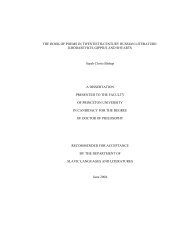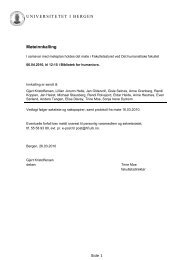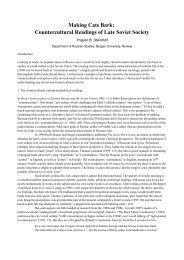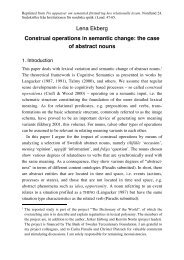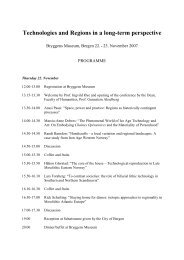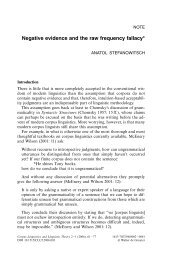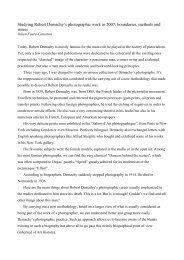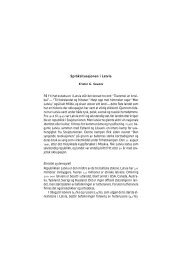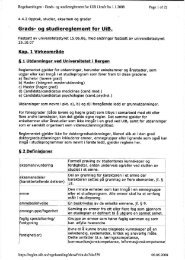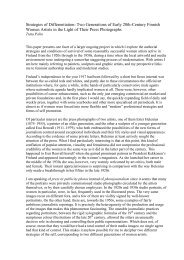Interview with Nikolai Vasin at the John Lennon Cathedral Office ...
Interview with Nikolai Vasin at the John Lennon Cathedral Office ...
Interview with Nikolai Vasin at the John Lennon Cathedral Office ...
Create successful ePaper yourself
Turn your PDF publications into a flip-book with our unique Google optimized e-Paper software.
Y. B. Steinholt St. Petersburg Rock <strong>Interview</strong>s 5: <strong>Nikolai</strong> <strong>Vasin</strong> 1<br />
<strong>Interview</strong> <strong>with</strong> <strong>Nikolai</strong> <strong>Vasin</strong><br />
<strong>at</strong> <strong>the</strong> <strong>John</strong> <strong>Lennon</strong> C<strong>at</strong>hedral <strong>Office</strong>, Pushkinskaia ulica 10,<br />
St. Petersburg, June 13 th , 2002.<br />
This interview was conducted by MD-player and microphone and subsequently put down and<br />
transl<strong>at</strong>ed into English by <strong>the</strong> interviewer. The interview is divided in three-minute tracks and<br />
track numbers are listed in <strong>the</strong> text. The track numbers do not necessarily coincide <strong>with</strong> breaks<br />
in <strong>the</strong> convers<strong>at</strong>ion.<br />
Y: Yngvar Steinholt<br />
KV: Kolia <strong>Vasin</strong><br />
In <strong>the</strong> following, brackets are used to:<br />
-Signify words or phrases th<strong>at</strong> have been added during transl<strong>at</strong>ion to clarify implied points,<br />
improve readability or supply additional inform<strong>at</strong>ion.<br />
-Add inform<strong>at</strong>ion on voice modes where this is a significant part of <strong>the</strong> message (laughter,<br />
audible smiles, ironic voice, etc.).<br />
Square brackets are used to mark:<br />
-Original Russian terms used by <strong>the</strong> interviewee, in italics.<br />
-Unidentified or partly unidentified words and expressions<br />
-My summary of phrases which could not be transl<strong>at</strong>ed in full due to reduced audibility.<br />
-Summaries of longer digressions, which have been left out.<br />
For more extensive inform<strong>at</strong>ion on interview context, please see <strong>at</strong>tached appendix (pp15-16).
Y. B. Steinholt St. Petersburg Rock <strong>Interview</strong>s 5: <strong>Nikolai</strong> <strong>Vasin</strong> 2<br />
TRACK 1<br />
Y: When did you hear about The Be<strong>at</strong>les for <strong>the</strong> first time?<br />
KV: It was in <strong>the</strong> beginning of 1964. I had just finished school, I was still a teenager, I was 18<br />
years old. And I remember th<strong>at</strong> I met, I even, I didn't learn about it from <strong>the</strong> radio, not from <strong>the</strong><br />
papers. But I learned it by <strong>the</strong> way of wh<strong>at</strong> we call <strong>the</strong> jungle telegraph [narodnaia molvá]. I<br />
tell you th<strong>at</strong> radio is <strong>the</strong> most important radio - <strong>the</strong> jungle telegraph. And so I met this friend of<br />
mine from school. And he asks:<br />
-Have you heard <strong>the</strong> Beetle-be<strong>at</strong>ers [zhuki-udarniki]?<br />
I say:<br />
-I don't even have an idea wh<strong>at</strong> th<strong>at</strong> is. I know Bill Haley, I know Little Richard, but <strong>the</strong><br />
Beetle-be<strong>at</strong>ers I don't know.<br />
-How can th<strong>at</strong> be! Th<strong>at</strong> band's a must! It's <strong>the</strong> newest, coolest band in England!<br />
Th<strong>at</strong>'s wh<strong>at</strong> he told me, and he goes:<br />
-I'll bring a tape player over to your place tomorrow and we'll listen to it!<br />
And so he comes to me <strong>with</strong> a little Aides-player, a player from Riga, and we listen to a<br />
recording made from BBC radio, <strong>the</strong> frequency changes, noise, cosmic interference hardly lets<br />
<strong>the</strong> music through. I remember hearing a kind of music th<strong>at</strong> I had never heard before. I had a<br />
feeling of utter [nevizny] and unusualness and I even leaned over to him and said something<br />
like:<br />
-Now I'll be damned, th<strong>at</strong>'s something new, <strong>the</strong>re wasn't anything like th<strong>at</strong> before!<br />
And th<strong>at</strong>'s it. Th<strong>at</strong>'s how it began. And from <strong>the</strong>n on <strong>the</strong> fur<strong>the</strong>r <strong>the</strong> more. A whole cardboard<br />
box of recordings of <strong>the</strong> Be<strong>at</strong>le-guys were brought to me, th<strong>at</strong> is <strong>the</strong> Beetle-be<strong>at</strong>ers from<br />
Liverpool, th<strong>at</strong>'s wh<strong>at</strong> <strong>the</strong>y were called <strong>at</strong> <strong>the</strong> time. On BBC Radio <strong>the</strong>re was a musical<br />
programme and it call <strong>the</strong>m <strong>the</strong> Beetle be<strong>at</strong>ers or <strong>the</strong> be<strong>at</strong>ers from Liverpool. And literally in<br />
<strong>the</strong> cause of a couple of months I became a passion<strong>at</strong>e Be<strong>at</strong>les-fan. I suddenly felt spellbound,<br />
enlightened, I enjoyed everything wildly and I already started collecting all kinds of articles<br />
about <strong>the</strong>m, I don't know wh<strong>at</strong>, recordings on bones <strong>the</strong>re were, too. Then <strong>the</strong>re was this<br />
newspaper from England, <strong>the</strong> Morning Star. I started running around to kiosks to get to know<br />
when <strong>the</strong> next issue would arrive, when it would be brought in and already in <strong>the</strong> early
Y. B. Steinholt St. Petersburg Rock <strong>Interview</strong>s 5: <strong>Nikolai</strong> <strong>Vasin</strong> 3<br />
morning I would run over and buy <strong>the</strong> fresh issue, because <strong>the</strong>re were very often articles about<br />
pop-music. It was called pop-music back <strong>the</strong>n.<br />
TRACK 2<br />
And articles about The Be<strong>at</strong>les [o Bitlakh]. And already by June 1964 <strong>the</strong> wallpaper in my<br />
room was Be<strong>at</strong>les all over. I remember <strong>the</strong> whole wall was about The Be<strong>at</strong>les and books about<br />
<strong>the</strong>m and I remember th<strong>at</strong> a lot of books about <strong>the</strong>m were published in Prague, small booklets,<br />
and in Budapest a book called ‘The Be<strong>at</strong>le Bible’ was published, but th<strong>at</strong>, in truth, was l<strong>at</strong>er.<br />
Well. And in such a manner, little by little I collected every detail. I ran, ran <strong>with</strong> <strong>the</strong> scissors<br />
and everywhere I cut out anything, exchanged, begged. It was, it was an entire epic which goes<br />
on still today.<br />
And sometime around 1966 I already had my own Be<strong>at</strong>les-club <strong>at</strong> home. A group of enthusiast<br />
friends, who knew all <strong>the</strong> Be<strong>at</strong>les-records, every little thing, who wrote it, wh<strong>at</strong> words <strong>John</strong> or<br />
Paul or George or Ringo were singing, we could already tell <strong>the</strong> differences. In <strong>the</strong> beginning<br />
we scrutinised photos of The Be<strong>at</strong>les and went:<br />
-Th<strong>at</strong>'s George.<br />
-No, it’s not, it's <strong>John</strong>!<br />
-Th<strong>at</strong>'s Paul.<br />
-No, th<strong>at</strong>'s Ringo [laughs]<br />
And <strong>at</strong> th<strong>at</strong> time in Russian <strong>the</strong>y were called <strong>the</strong> Be<strong>at</strong>le-bro<strong>the</strong>rs, because <strong>the</strong>y were united,<br />
<strong>the</strong>ir style of <strong>the</strong>ir clo<strong>the</strong>s was <strong>the</strong> same, <strong>the</strong> hairstyles and <strong>the</strong>y said <strong>the</strong> Be<strong>at</strong>le-bro<strong>the</strong>rs<br />
resemble each o<strong>the</strong>r.<br />
Y: And how many fans were <strong>the</strong>re around <strong>at</strong> th<strong>at</strong> time.<br />
KV: There were very many fans, I think <strong>the</strong>re were a few thousands. Then <strong>the</strong>y became a<br />
million [laughs]. Well th<strong>at</strong> is how it started and...<br />
Y: ...and <strong>the</strong>n <strong>the</strong> bands appeared.<br />
KV: And <strong>the</strong>n in 1966, in <strong>the</strong> beginning of 1966 I remember th<strong>at</strong> someone called me and said
Y. B. Steinholt St. Petersburg Rock <strong>Interview</strong>s 5: <strong>Nikolai</strong> <strong>Vasin</strong> 4<br />
-Listen, come <strong>with</strong> me to <strong>the</strong> dances, <strong>the</strong>re's a band th<strong>at</strong>'s going to sing Be<strong>at</strong>les!<br />
And I go to <strong>the</strong> dances, such a shy, introvert boy, now, well, and I look <strong>at</strong> <strong>the</strong> band on stage and<br />
<strong>the</strong>y already have forelocks, electric guitars and I'm told <strong>the</strong>y made <strong>the</strong> guitars <strong>the</strong>mselves. Can<br />
you imagine, <strong>the</strong> boys made <strong>the</strong>ir own guitars. Th<strong>at</strong> is <strong>the</strong>y took a panel of a sofa, cut it into <strong>the</strong><br />
shape of a guitar, <strong>with</strong> <strong>the</strong> proper horn-shapes and made a neck from some strong wood, took<br />
strings from a piano, strung <strong>the</strong>m onto <strong>the</strong> guitars and started playing [laughs]. I was even told<br />
a story about some such DIY-ers, th<strong>at</strong> <strong>the</strong>y put <strong>the</strong>ir entire house on end, sawing all <strong>the</strong> time in<br />
<strong>the</strong>ir fl<strong>at</strong>. They sawed, <strong>the</strong> neighbours complained to <strong>the</strong> militsiia. The militsiia comes and<br />
finds in <strong>the</strong>ir fl<strong>at</strong> an entire guitar-building workshop! [laughs] And on all [such guitars] <strong>the</strong>y<br />
painted ‘Rickenbacker’, ‘Muzima’ and everything <strong>the</strong>y wrote in proper English letters.<br />
Y: Th<strong>at</strong> is ‘real’ copies?<br />
KV: Yes, copies but such copies th<strong>at</strong> people would come asking:<br />
-Wow, wh<strong>at</strong>'s it you've got <strong>the</strong>re, an American Fender?<br />
- Well, no, we made it ourselves. [laughs]<br />
And <strong>the</strong>y even learned how to make <strong>the</strong> strings. People who worked in factories were already<br />
using <strong>the</strong>ir benches to make strings. You see, <strong>the</strong> Russian DIY-ers [could] make everything, but<br />
unfortun<strong>at</strong>ely <strong>the</strong>y couldn’t make good music for a long time to come (<strong>Vasin</strong> in Steinholt<br />
2002a: 4).<br />
Y: Also presumably because of lack of sound equipment...<br />
TRACK 3<br />
KV: There wasn't much sound-gear, not much devotion, and <strong>the</strong>re was a lack of talent among<br />
our musicians. They played well, <strong>the</strong>y made good Be<strong>at</strong>le impressions, Rolling Stones <strong>the</strong>y<br />
made, I remember, Kinks, Hollies, Animals, rock-’n’-roll numbers, our musicians occasionally<br />
sung Chuck Berry. But <strong>the</strong>y didn't make very interesting things <strong>the</strong>mselves. I can't remember<br />
th<strong>at</strong> anything from <strong>the</strong> 60s... Some tried to sing in Russian, but th<strong>at</strong> was uninteresting, boring<br />
and we regarded it as, well like wh<strong>at</strong>, like parody, you see. Parodies of The Be<strong>at</strong>les. Th<strong>at</strong><br />
people just wanted, but were unable to. And only towards <strong>the</strong> end of <strong>the</strong> 70s good band started
Y. B. Steinholt St. Petersburg Rock <strong>Interview</strong>s 5: <strong>Nikolai</strong> <strong>Vasin</strong> 5<br />
emerging over here. In <strong>the</strong> mid-to-l<strong>at</strong>e 70s we were already listening to bands th<strong>at</strong> sang in<br />
Russian and were more or less bearable. We could listen to <strong>the</strong>m.<br />
Y: And wh<strong>at</strong> were <strong>the</strong> first bands called?<br />
KV: Such bands like Rossiiane emerged, <strong>the</strong>n <strong>the</strong>re was a good band called Mify <strong>with</strong> Iurii<br />
Il'chenko, in 1976 we got a-ah, Zemliane was ano<strong>the</strong>r group, but <strong>the</strong>y were copying Deep<br />
Purple, <strong>the</strong> Zemliane.<br />
Y: And <strong>the</strong> Be<strong>at</strong>le-bands of earlier, from 1966-67?<br />
KV: Ah, from 66 on <strong>the</strong>re was a very good band called Argonavty, ano<strong>the</strong>r good group was<br />
Lesnye br<strong>at</strong>'ia, Flamingo, Q-69... Favority was a nice band.<br />
Y: Metastazy [sic]?<br />
KV: Metastazy! But th<strong>at</strong> was a band th<strong>at</strong> only did English music, a little American. But<br />
generally we usually favoured English music. The English flag, if you had an English flag <strong>at</strong><br />
home, well, you were regarded as, th<strong>at</strong> you're really advanced, you see? You're cool. The<br />
English flag, if someone had a symbol like th<strong>at</strong>, <strong>the</strong>n it... It was <strong>the</strong> gre<strong>at</strong>est treasure. And in<br />
any case we were collecting anything English, we cheered for <strong>the</strong> English world championship<br />
football team, you see, back <strong>the</strong>n.<br />
Y: And why exactly England?<br />
KV: Because The Be<strong>at</strong>les were English! Th<strong>at</strong> means English music was hotter than any o<strong>the</strong>r<br />
music. There were lots of new ideas. It was <strong>the</strong> music of freedom, don't forget th<strong>at</strong> we were<br />
living in a closed society. We lived behind <strong>the</strong> iron curtain and for me, for us, th<strong>at</strong> music th<strong>at</strong><br />
we hadn't heard (before), th<strong>at</strong> very English music, <strong>the</strong> music of The Be<strong>at</strong>les was a symbol not<br />
only of happiness and enjoyment but also a symbol of freedom for us.
Y. B. Steinholt St. Petersburg Rock <strong>Interview</strong>s 5: <strong>Nikolai</strong> <strong>Vasin</strong> 6<br />
TRACK 5<br />
It was like if it had punched a hole in th<strong>at</strong> wall, behind which we lived, it destroyed th<strong>at</strong> wall<br />
and conceptually it was as if it brought us toge<strong>the</strong>r <strong>with</strong> <strong>the</strong> whole world. And we wanted to<br />
know wh<strong>at</strong> was going on in <strong>the</strong> world behind <strong>the</strong> iron curtain, because <strong>the</strong> newspapers were<br />
lying. The papers wrote only politics and we didn't like politics, we knew th<strong>at</strong> we were being<br />
fooled and <strong>the</strong>refore we believed in The Be<strong>at</strong>les. And we believed in <strong>the</strong>ir music and for us th<strong>at</strong><br />
was <strong>the</strong> very best time of <strong>at</strong>tendance. We g<strong>at</strong>hered toge<strong>the</strong>r, drank wine, someone would put a<br />
bottle of wine in <strong>the</strong> middle of <strong>the</strong> table, we threw ourselves into [vrubali v] 'Help' or ‘The<br />
Sergeant’, 'Revolver' or 'Rubber Soul' or 'White Album' and flew away. We stuck toge<strong>the</strong>r, we<br />
were bro<strong>the</strong>rs in music. Those were fantastic times.<br />
Y: Did you understand <strong>the</strong> lyrics of The Be<strong>at</strong>les from <strong>the</strong> beginning?<br />
KV: We transl<strong>at</strong>ed <strong>the</strong> lyrics! Of course we knew <strong>the</strong>m. Some of us knew English pretty well,<br />
found <strong>the</strong> lyrics somewhere in <strong>the</strong> magazines or by ear. Someone who knew English well<br />
listened <strong>at</strong>tentively to <strong>the</strong> music, wrote down <strong>the</strong> lyrics and transl<strong>at</strong>ed <strong>the</strong>m. And <strong>the</strong>y started to<br />
spread <strong>the</strong> lyrics, typed <strong>the</strong>m on typewriters, usually, <strong>the</strong>re weren't any photocopiers, <strong>the</strong>y were<br />
banned. And we would give <strong>the</strong> be<strong>at</strong>le-lyrics to some girl who would discreetly type <strong>the</strong>m <strong>at</strong><br />
work, out of sight from <strong>the</strong> administr<strong>at</strong>ion.<br />
Y: Not more than seven copies?<br />
KV: Yes <strong>the</strong>re were maximum five to seven copies. And <strong>the</strong>n, gradually all <strong>the</strong>se books were<br />
compiled <strong>at</strong> my place. They are all self-made books. About The Be<strong>at</strong>les, about Elvis, about<br />
Russian rock, those I showed you, so th<strong>at</strong> here is <strong>the</strong> whole history th<strong>at</strong> I collected during <strong>the</strong>se<br />
years, during <strong>the</strong>se 50 years, well, 40 it is. Every little drop of it is here, down to <strong>the</strong> tiniest<br />
article, and from <strong>the</strong> Russian, pardon, Soviet [sovkovaia] press. Well I once even collected<br />
<strong>the</strong>se moronic articles, but mostly I concentr<strong>at</strong>ed on articles th<strong>at</strong> were to <strong>the</strong> point. Th<strong>at</strong> is <strong>the</strong>y<br />
wrote <strong>the</strong> truth [pravda], about wh<strong>at</strong> really was, <strong>the</strong>y didn't lie. And sometime in 1971 I<br />
arranged my first underground concert. We met <strong>the</strong>re. I had met some new friends and we met<br />
to discuss <strong>the</strong> subject. We went through it all and decided to make a first gig. And so I became
Y. B. Steinholt St. Petersburg Rock <strong>Interview</strong>s 5: <strong>Nikolai</strong> <strong>Vasin</strong> 7<br />
something like a foreman of this underground club. They chose me, <strong>the</strong> meeting was a proper,<br />
solid one, but held carefully, of course. Without anything official, <strong>with</strong>out documents, <strong>with</strong>out<br />
any papers.<br />
TRACK 6<br />
We didn't write anything. But we met and decided to start an underground rock club, not a<br />
Be<strong>at</strong>le club. The Be<strong>at</strong>le club was home <strong>at</strong> my place. We made concerts for all groups. Who<br />
wanted to, could come and play. We didn't demand anything from anyone, see? It's now th<strong>at</strong><br />
we are doing <strong>the</strong> Be<strong>at</strong>le-birthdays, for instance for <strong>the</strong> next Paul McCartney's birthday I invite<br />
all <strong>the</strong> boys to sing Be<strong>at</strong>le-songs. And because th<strong>at</strong>'s a birthday, it isn't fitting to play nei<strong>the</strong>r<br />
Deep Purple not your own things, right? And th<strong>at</strong>’s final. But back <strong>the</strong>n we didn't set up any<br />
restrictions for anyone, we just said:<br />
-Boys, tonight,<br />
‘cause we made concerts in <strong>the</strong> night,<br />
-Tonight <strong>the</strong>re'll be a concert <strong>at</strong> this or th<strong>at</strong> school.<br />
We made agreements <strong>with</strong> <strong>the</strong>se school caretakers [zavkhozy], some sort of directors in <strong>the</strong>ir<br />
own right. Gave him a little bit of money, made home-made tickets, we drew <strong>the</strong>m ourselves,<br />
those tickets, and sold <strong>the</strong>m for a miserable price. Then, after concerts, we'd make banquets.<br />
Our bands from Piter played, of course. The concert would go on for a couple of hours,<br />
afterwards people went silently home and th<strong>at</strong> was all. There wasn't anything special to it, no<br />
politics, nobody cried ‘Down <strong>with</strong> <strong>the</strong> Soviets [sovki]!’ or ‘Down <strong>with</strong> those commies!’ See?<br />
Nobody cried because we were disgusted even by speaking of <strong>the</strong>m. And we were afraid.<br />
Everybody was afraid of politics. For political reasons you could lose your job or go to prison,<br />
see? For fifteen days, for a year.<br />
So in this way we started making concert and it goes on to this very day. And <strong>the</strong> next concert<br />
coming up now is Paul McCartney's birthday. In five days. We'll meet by <strong>the</strong> Bay of Finland,<br />
we already met <strong>the</strong>re every year for 20 years around <strong>the</strong> fire, we put a white tablecloth on <strong>the</strong><br />
ground. Everybody brings something and puts it on <strong>the</strong> tablecloth, see. There's wine, snacks,<br />
sausage, cheese, everything and so our celebr<strong>at</strong>ion may start. Afterwards when everyone has<br />
had something to e<strong>at</strong> and feels relaxed, <strong>the</strong> music begins. The boys bring guitars and we start
Y. B. Steinholt St. Petersburg Rock <strong>Interview</strong>s 5: <strong>Nikolai</strong> <strong>Vasin</strong> 8<br />
singing Be<strong>at</strong>le-songs. And <strong>the</strong> socialising goes on, someone would like to take a walk,<br />
someone would like to swim, see? So th<strong>at</strong>'s how it is, th<strong>at</strong>'s how our birthday celebr<strong>at</strong>ions have<br />
been held for about 30 years now. And in town too, we sometimes hold concerts on <strong>the</strong><br />
birthdays of <strong>John</strong> and George Harrison, th<strong>at</strong> is, in winter and we hold <strong>the</strong> concerts in a concert<br />
hall. And in summer we are outside. The birthdays of Paul Mc Cartney and Ringo are usually<br />
held outdoors, somewhere in <strong>the</strong> woods.<br />
Y: Why do you think th<strong>at</strong> exactly The Be<strong>at</strong>les had such an impact on Soviet youth of <strong>the</strong> 60s<br />
and 70s?<br />
TRACK 7<br />
KV: O-oh, you see. Be<strong>at</strong>les. The Be<strong>at</strong>les wrote <strong>the</strong>ir music <strong>the</strong>mselves and played it<br />
<strong>the</strong>mselves. Th<strong>at</strong> was <strong>the</strong>ir enormous, <strong>the</strong> enormous dignity of th<strong>at</strong> band. Because most groups<br />
were merely playing music made by o<strong>the</strong>rs [chuzhaia muzyka]. And Elvis Presley, <strong>the</strong> king of<br />
rock 'n' roll, wrote only five things himself. Although he performed almost half a thousand<br />
songs th<strong>at</strong> he recorded during his whole carreer. You see? He wrote five in all!<br />
[Knocks his finger repe<strong>at</strong>edly on <strong>the</strong> table during <strong>the</strong> following:]<br />
But The Be<strong>at</strong>les, from <strong>the</strong> two hundred songs <strong>the</strong>y recorded on <strong>the</strong>ir albums <strong>the</strong>y wrote one<br />
hundred and seventy <strong>the</strong>mselves, you see some difference <strong>the</strong>re? Therefore. Th<strong>at</strong> is something<br />
of an extraordinary factor, isn't it? And extraordinary <strong>the</strong>y were, too, those prim<strong>at</strong>es, see?<br />
There was a short distance between <strong>the</strong> souls, you see wh<strong>at</strong> I mean? When someone makes his<br />
music himself and performs it, it finds <strong>the</strong> soul of ano<strong>the</strong>r, ano<strong>the</strong>r human who listens. And it's<br />
colossal when <strong>the</strong> p<strong>at</strong>h is direct, goes directly from soul to soul. The music became a bridge<br />
between us. And The Be<strong>at</strong>les wrote <strong>the</strong> very best music of <strong>the</strong>ir time <strong>at</strong> th<strong>at</strong>. They were above<br />
anybody else. They seemed to move <strong>the</strong> frames of both time and art and music and poetry and<br />
show, you see? And <strong>the</strong>y are good-looking, too. They have <strong>the</strong> looks, <strong>the</strong>y are handsome guys.<br />
They play gre<strong>at</strong> on <strong>the</strong>ir instruments, <strong>the</strong>y record fantastic records, each and every of <strong>the</strong>m sing<br />
very well, <strong>the</strong>y make brilliant poetry, you see, th<strong>at</strong> is, th<strong>at</strong> is The Be<strong>at</strong>les.<br />
Y. And always something new going on...
Y. B. Steinholt St. Petersburg Rock <strong>Interview</strong>s 5: <strong>Nikolai</strong> <strong>Vasin</strong> 9<br />
KV: Always something new, every new records differs from <strong>the</strong> preceding one. When rumours<br />
began circul<strong>at</strong>ing th<strong>at</strong> a new release is coming up, th<strong>at</strong> The Be<strong>at</strong>les are recording a new album,<br />
we got a feeling of suppressed happiness from <strong>the</strong> (future) acquaintance <strong>with</strong> th<strong>at</strong> record.<br />
Again <strong>the</strong>y wrote: ‘In one month a new disc by The Be<strong>at</strong>les will be released.’ and we were<br />
already warming each o<strong>the</strong>r up:<br />
-Listen, In a month a new Be<strong>at</strong>le-record will be released, yeah, hurrah! [claps his hands<br />
and laughs]<br />
Everybody were already celebr<strong>at</strong>ing: ‘Oi! Magnificent! Th<strong>at</strong>'s <strong>the</strong> gre<strong>at</strong>est news!’. And we<br />
were exchanging news. Say one guy knows some kind of thing <strong>the</strong>re, cause <strong>the</strong>y've already<br />
played one song from <strong>the</strong> forthcoming album on <strong>the</strong> radio and he'll tell every o<strong>the</strong>r Be<strong>at</strong>le-fan<br />
in Piter about it. And he is already, it is as if he has merged <strong>with</strong> <strong>the</strong> voice of th<strong>at</strong> radio<br />
programme:<br />
-Oh, Petia, <strong>the</strong>y already know <strong>the</strong> new Be<strong>at</strong>le-song over <strong>the</strong>re<br />
-Petia is cool, wh<strong>at</strong> a gre<strong>at</strong> guy!<br />
You see, everything went around [laughs]. And a guy like th<strong>at</strong> became <strong>the</strong> number one of our<br />
circle of friends and everyone would tre<strong>at</strong> him <strong>with</strong> respect and ask:<br />
-Petia, tell us about <strong>the</strong> new song by The Be<strong>at</strong>les! Wh<strong>at</strong>'s it called. Who's singing, <strong>John</strong><br />
or Paul or George or wh<strong>at</strong>?<br />
And he'll tell everyone everything and we will listen <strong>with</strong> open mouths:<br />
-Th<strong>at</strong>'s <strong>the</strong> stuff! Th<strong>at</strong> [claps hands] is gonna be one gre<strong>at</strong> album!<br />
-Yes, of course it'll be a gre<strong>at</strong> one, The Be<strong>at</strong>les never make no weak albums.<br />
And all <strong>the</strong> o<strong>the</strong>r bands lived on single hits, I think.<br />
TRACK 8<br />
One or two things were good, but The Be<strong>at</strong>les had only good things. Every record, not only<br />
single, but long player, was a hit. Th<strong>at</strong> is it went directly to spot 1. Afterwards we learned th<strong>at</strong><br />
every record by The Be<strong>at</strong>les had been a number one, can you imagine? 45s and LPs [diski]<br />
alike. Therefore. And <strong>the</strong>n The Be<strong>at</strong>les was a very good kind of unity of characters. Paul<br />
McCartney was <strong>the</strong> soft one who sang ballads; <strong>John</strong> <strong>Lennon</strong>, such a powerful, passion<strong>at</strong>e <strong>John</strong>,<br />
who sang <strong>the</strong> heavy things, you see, <strong>the</strong> one who always had a strained voice, who had a pain,
Y. B. Steinholt St. Petersburg Rock <strong>Interview</strong>s 5: <strong>Nikolai</strong> <strong>Vasin</strong> 10<br />
a pain in his voice. Then it was George Harrison, <strong>the</strong> mystically minded special be<strong>at</strong>le. We<br />
called him Special Be<strong>at</strong>le. And alongside him Ringo Starr, <strong>the</strong> gre<strong>at</strong> drummer who feels his<br />
fellows, his friends and always played brilliantly on <strong>the</strong> drums, always had a feeling of <strong>the</strong><br />
mood of <strong>the</strong> things and didn't sing bad (ei<strong>the</strong>r).<br />
You see not only Paul and <strong>John</strong> wrote songs, l<strong>at</strong>er George began writing more and more<br />
[knocks finger on table] and Ringo more and more. Though Ringo only wrote a few things<br />
during his years <strong>with</strong> The Be<strong>at</strong>les. In <strong>the</strong> eight years <strong>the</strong>y were toge<strong>the</strong>r Ringo wrote three<br />
songs, George wrote 22 songs, you see. But <strong>John</strong> wrote 80 songs. And Paul McCartney wrote<br />
in all 65 songs, you see. Th<strong>at</strong> is <strong>John</strong> was <strong>the</strong> most productive. But <strong>the</strong> way in which <strong>the</strong>ir<br />
characters mingled, everyone would contribute something of his own to th<strong>at</strong> music. Th<strong>at</strong> added<br />
many layers to <strong>the</strong> music, like a very tasty pirog, you see, it was a feast to listen to. And one of<br />
my friends, he literally said <strong>the</strong> following:<br />
-Kolia, I listen to every Be<strong>at</strong>le-record five times. To begin <strong>with</strong>, first thing, I listen to<br />
<strong>the</strong> voice, play <strong>the</strong> record and listen to how The Be<strong>at</strong>les sing. Then, <strong>the</strong> second time, I<br />
listen to <strong>the</strong> lead guitar, carefully to <strong>the</strong> phrases in <strong>the</strong>re, solos, see? Then I listen a third<br />
time and focus only on <strong>the</strong> bass guitar separ<strong>at</strong>ely, listen carefully to how McCartney<br />
plays <strong>the</strong> bass. Then I listen a fourth time. I listen only to <strong>the</strong> drums.<br />
You see? Th<strong>at</strong>'s how people were listening to The Be<strong>at</strong>les back <strong>the</strong>n. I think th<strong>at</strong> <strong>the</strong>y listen in<br />
<strong>the</strong> very same way even today. And <strong>the</strong>n we did believe in <strong>the</strong> idea, th<strong>at</strong> to understand The<br />
Be<strong>at</strong>les, you had to listen to th<strong>at</strong> music time and time again. It often didn't get to you properly<br />
<strong>the</strong> first time. To let good music in it is necessary to listen to it many times and <strong>at</strong> some point,<br />
somehow during one of numerous listenings enlightenment is suddenly reached and I think:<br />
‘My God! But th<strong>at</strong>'s fantastic!’ You see? Th<strong>at</strong>’s wh<strong>at</strong> The Be<strong>at</strong>les did to us.<br />
But <strong>the</strong>n we began listening to o<strong>the</strong>r bands as well. For instance I listened a lot to Jimi Hendrix<br />
in my time.<br />
TRACK 9<br />
I loved <strong>the</strong> fourth album by Led Zeppelin and listen a lot to <strong>the</strong> second album, too. L<strong>at</strong>er I<br />
listened a lot to Deep Purple. I loved <strong>the</strong> first album Deep Purple in Rock and so on and on. I
Y. B. Steinholt St. Petersburg Rock <strong>Interview</strong>s 5: <strong>Nikolai</strong> <strong>Vasin</strong> 11<br />
loved <strong>the</strong> Liverpool sound, zvuk Liverpulia I loved a lot. I loved Singing Blue Jean Searchers,<br />
Mersey Be<strong>at</strong>, <strong>the</strong>re was such a band. Then, Big Tree and so on and on again. I listened a little<br />
to Jerry and The Pacemakers. Yes, so <strong>the</strong>re was a lot of interesting things <strong>the</strong>re too. And <strong>at</strong> one<br />
point I even listened to Elton <strong>John</strong>, when he recorded Yellow Brick Road. I listened a lot to <strong>the</strong><br />
first albums by Creedence, a lot to Doors, Janis Joplin I listened to and so on and on. There<br />
were many good bands. Then came art-rock. George Harrison gave <strong>the</strong> world raga-rock, <strong>the</strong>n<br />
came hard rock and so on: There was lots and lots of everything.<br />
The Be<strong>at</strong>les gave music a push ahead and all kinds of <strong>the</strong> most distinctive musics appeared. Art<br />
rock, for example Yes or Gentle Giant played such a... Then jazz rock was also a very special<br />
music. Blood Swe<strong>at</strong> & Tears, Chicago emerged and <strong>the</strong>re was lots and lots of music. And we<br />
talked a lot about <strong>the</strong> festival <strong>at</strong> Woodstock. We talked about <strong>the</strong> fact th<strong>at</strong> it was rock th<strong>at</strong><br />
g<strong>at</strong>hered such a huge mass of people. Half a million young people had g<strong>at</strong>hered in a valley to<br />
listen to music. You see. Not classic, not jazz, no o<strong>the</strong>r music. Not war music. You know th<strong>at</strong><br />
<strong>John</strong> <strong>Lennon</strong> said <strong>at</strong> some point th<strong>at</strong> only rock had g<strong>at</strong>hered such a mass of people. Even...<br />
Ah... Only war had been able to g<strong>at</strong>her an equally large number of people toge<strong>the</strong>r, <strong>at</strong> times of<br />
war, when lots of people were called to arms, were g<strong>at</strong>hered for war and millions march, but<br />
<strong>the</strong>y march <strong>with</strong> arms. But here <strong>the</strong>re were people <strong>with</strong> guitars. You see wh<strong>at</strong> a gre<strong>at</strong> idea <strong>the</strong>re<br />
was in rock! Wh<strong>at</strong> did rock give us? Rock gave us freedom, love and peace, you see, and <strong>the</strong>se<br />
things were sacred to us. And <strong>the</strong>y remain sacred to this very day. Th<strong>at</strong>'s why I'm building a<br />
c<strong>at</strong>hedral for freedom, for love, for peace and for music.<br />
Y: I see. Wh<strong>at</strong> do you think, were Be<strong>at</strong>les and Be<strong>at</strong>le-fans a phenomenon th<strong>at</strong> was limited to<br />
<strong>the</strong> big cities?<br />
KV: I think it was everywhere, th<strong>at</strong> Be<strong>at</strong>le-fans were everywhere. In Russia. In every little<br />
hole, as we used to say, in every... every village, in every little smalltown s<strong>at</strong> some little boy<br />
who listened carefully to <strong>the</strong> radio, who thumbed through all <strong>the</strong> papers and cut out things and<br />
made albums <strong>with</strong> articles about The Be<strong>at</strong>les, and listened to <strong>the</strong> BBC and Voice of America<br />
and was in some way <strong>at</strong> <strong>the</strong> navel of <strong>the</strong> earth. Navel, navel of <strong>the</strong> earth, you know <strong>the</strong>re is such<br />
an expression. He was a little navel for himself out <strong>the</strong>re in th<strong>at</strong> smalltown and I know th<strong>at</strong> all
Y. B. Steinholt St. Petersburg Rock <strong>Interview</strong>s 5: <strong>Nikolai</strong> <strong>Vasin</strong> 12<br />
over Russia <strong>the</strong>re are thousands and thousands of Be<strong>at</strong>les fans, who sit in and wait, you see,<br />
<strong>the</strong>y wait, drift around, collect everything, save it like photos of mom and dad, you see, photos<br />
of The Be<strong>at</strong>les under <strong>the</strong> pillow. Such was our rel<strong>at</strong>ionship <strong>with</strong> The Be<strong>at</strong>les.<br />
Y: Did <strong>the</strong> impact, <strong>the</strong> influence from The Be<strong>at</strong>les on Russian rock last long?<br />
KV: I think it continues still today: Of course it was thanks to The Be<strong>at</strong>les th<strong>at</strong> our bands of <strong>the</strong><br />
60s and 70s appeared. At first <strong>the</strong>y sang in English, <strong>the</strong>n <strong>the</strong>y started writing <strong>the</strong>ir own things,<br />
<strong>the</strong>n we got a Rock Club as a consequence. You know th<strong>at</strong> well, <strong>the</strong> first Rock Club, again, in<br />
<strong>the</strong> country. To us it was both surprising and n<strong>at</strong>ural and we all went to <strong>the</strong> Rock Club and I<br />
listened to our bands. It was interesting, <strong>the</strong> 80s were very, very... It was a colossal cre<strong>at</strong>ive lift,<br />
although <strong>the</strong>y all, of course, were applied English and American ideas, ideas from The Be<strong>at</strong>les,<br />
ideas from new-wave [novaia volná], punk rock was for our guys... It was important to certain<br />
people, too. They also shook <strong>the</strong>ir heads and guitars and hollered something in some<br />
inscrutable language, some swahili, you know a language from which nobody understands a<br />
bit. But it's full of energy, no music but lots of energy, and people needed th<strong>at</strong> too back <strong>the</strong>n.<br />
But nowadays many bands just simply take whole ideas, song structures and harmonies, all<br />
kinds of progressions from The Be<strong>at</strong>les, you see. The Be<strong>at</strong>les have not only beautiful melodies,<br />
but also interesting harmonies, interesting vocal things. Sometimes <strong>the</strong>y have four voices and<br />
every voice sings its own piece, you see. All this is a colossal school of life and music and<br />
<strong>the</strong>refore we still have bands th<strong>at</strong> copy The Be<strong>at</strong>les or borrow a lot from <strong>the</strong>m, see. So good<br />
music is forever, it never goes away. It will remain forever.<br />
Y: Wh<strong>at</strong> aspects of <strong>the</strong> music of The Be<strong>at</strong>les do you think made <strong>the</strong> biggest impact on <strong>the</strong><br />
works of Russian bands? How can you hear it in <strong>the</strong>ir music? Let's take Akvarium as an<br />
example.<br />
TRACK 11<br />
KV: Well, Akvarium above all listened a lot to <strong>the</strong> Be<strong>at</strong>les and only <strong>the</strong>n took up <strong>the</strong> guitars,<br />
you see. The Be<strong>at</strong>les gave <strong>the</strong>m <strong>the</strong>ir cre<strong>at</strong>ive push. But if The Be<strong>at</strong>les have many directions,
Y. B. Steinholt St. Petersburg Rock <strong>Interview</strong>s 5: <strong>Nikolai</strong> <strong>Vasin</strong> 13<br />
Akvarium picked out only one direction, <strong>the</strong> acoustic, see. Akvarium played on acoustic<br />
guitars and just like Paul McCartney <strong>the</strong>y used strings, violins and cello, see. And th<strong>at</strong>, th<strong>at</strong> all<br />
contributed to <strong>the</strong> lads finding some kind of sound of <strong>the</strong>ir own, a Russian sound, a Russian<br />
music, a sort of Russian chanson you see. Well.<br />
Y. But wh<strong>at</strong>'s Russian in Russian rock? Is it possible to identify some kind of Russian qualities<br />
in Russian rock?<br />
KV: The same as all over <strong>the</strong> world! Love, peace, freedom. Th<strong>at</strong>'s wh<strong>at</strong> th<strong>at</strong> music brought us<br />
and when we heard <strong>the</strong> Rossiiane, Akvarium, Zoopark, DDT or Kostia Kinchev, see, we<br />
understood th<strong>at</strong> in th<strong>at</strong> music <strong>the</strong>re is freedom, in th<strong>at</strong> music is th<strong>at</strong>, wh<strong>at</strong> we didn't have before<br />
<strong>the</strong>m, before those guys. Earlier we had <strong>the</strong>, say, Kremlin's faithful, say, court-music, <strong>the</strong><br />
estrada. Correct bald-headed people in ties stood forth and sang some pseudo-folk estrada<br />
songs, understand? Or <strong>the</strong>y sang classic. 19 th century, 18 th century, 17 th century, barocco or<br />
some opera, opera arias. Th<strong>at</strong> was all we got to hear. But rock gave us so much (more), so<br />
many new things. It began to open up life, not only in <strong>the</strong> West but over here too. Lots of<br />
interesting bands emerged here too and <strong>the</strong>y played both acoustic music and electric music.<br />
Pardon! [gesticul<strong>at</strong>ed mike off table] And light music and heavy music, sometimes silly,<br />
sometimes wise, see. Sometimes it was some sort of philosophy on a sufficiently high level,<br />
th<strong>at</strong> made it possible to keep thinking about it and keep it in mind.<br />
Our bands made many good things, but <strong>the</strong>y <strong>with</strong>ered fast. Already towards <strong>the</strong> end of <strong>the</strong> 80s.<br />
In <strong>the</strong> beginning of <strong>the</strong> 80s it began to rise and towards <strong>the</strong> end of <strong>the</strong> 80s it ended. It all<br />
became uninteresting and <strong>the</strong> audience went cold, <strong>the</strong> halls went empty, less records were sold<br />
and so on and on, see? Well and I, for instance, towards <strong>the</strong> end of <strong>the</strong> 80s I began turning<br />
away from Russian rock. In <strong>the</strong> l<strong>at</strong>e 70s I heard Mashina vremeni, I began taking interest in<br />
Vysotsky and our bands from Piter. Akvarium. I listened a bit to Strannye igry, it was such a<br />
good band and I listened to Televizor, to Zoopark, to Kostia Kinchev and Alisa and after some<br />
time I turned my back on those bands. They didn't move me anymore. It was (all) <strong>the</strong>re, but<br />
<strong>the</strong>n I lost interest in <strong>the</strong>m. And <strong>the</strong>y started to perform less interesting music, write, compose.<br />
They just, well...
Y. B. Steinholt St. Petersburg Rock <strong>Interview</strong>s 5: <strong>Nikolai</strong> <strong>Vasin</strong> 14<br />
Y. Why was th<strong>at</strong>? Did it have anything to do <strong>with</strong> <strong>the</strong> changes, th<strong>at</strong> suddenly everything<br />
became possible?<br />
KV: It seems to me th<strong>at</strong> for everything <strong>the</strong>re is a simple change. There's night <strong>the</strong>re's day, see?<br />
Night passes, <strong>the</strong> sun rises, <strong>the</strong> day arrives, sun goes down, disappears and <strong>the</strong> night is on<br />
again. In <strong>the</strong> same way, <strong>the</strong> very same way, art develops, I think. It takes off, <strong>the</strong>n comes down,<br />
<strong>the</strong>n takes off and comes down again. It interests us and we love it, <strong>the</strong>n on <strong>the</strong> contrary it<br />
wakes antip<strong>at</strong>hy and some kind of sorrow, like <strong>the</strong>y are boring you. See? I think only in th<strong>at</strong><br />
way.<br />
Y: So you don't think, <strong>the</strong>n, th<strong>at</strong> this may in some way be connected to <strong>the</strong> pressure from <strong>the</strong><br />
authorities, th<strong>at</strong> when <strong>the</strong> pressure ceased...<br />
KV: Now, now <strong>the</strong>re is no pressure. After Perestroika <strong>the</strong>re is no pressure, <strong>the</strong>refore music now<br />
develops in accordance <strong>with</strong> laws th<strong>at</strong> we don't know. There can only be one law: Ei<strong>the</strong>r it [<strong>the</strong><br />
music] brings people joy or it doesn't bring people joy. Sometimes it does. In <strong>the</strong> 80s it did.<br />
Inspir<strong>at</strong>ion came to a whole array of our bands. Now th<strong>at</strong> inspir<strong>at</strong>ion is gone, and th<strong>at</strong>'s all. And<br />
<strong>the</strong> powers just aren't part of it. Th<strong>at</strong> was earlier. The sovok [soviet man/system] put pressure,<br />
<strong>the</strong> sovok cut our wings and <strong>the</strong>refore <strong>the</strong> guys couldn't cre<strong>at</strong>e properly, couldn't open up. They<br />
cre<strong>at</strong>ed in <strong>the</strong> underground [podpole], <strong>the</strong>re was an underground [andergraund], see? Therefore<br />
we didn't have any beautiful, inspiring musics, from God, but <strong>the</strong>re was such a music, like<br />
piracy. Th<strong>at</strong>’s why it wasn't of very high quality, but it had <strong>the</strong> energy! It had <strong>the</strong> energy, life, it<br />
had something it wanted, it already had caprice, it is such a caprice in <strong>the</strong> human soul: ‘I want<br />
to fly, but as yet I can't!’.<br />
Appendix 1: <strong>Interview</strong> description<br />
Because of a first interview, th<strong>at</strong> was lost due to technical problems, both <strong>the</strong> interviewee and<br />
myself were better prepared on this occasion and <strong>the</strong> interview went faster and smoo<strong>the</strong>r,<br />
although it became less personal than <strong>the</strong> first. <strong>Vasin</strong> seemed more secure this time. He was s<strong>at</strong>
Y. B. Steinholt St. Petersburg Rock <strong>Interview</strong>s 5: <strong>Nikolai</strong> <strong>Vasin</strong> 15<br />
in his chairman armchair in his office, surrounded by an enormous amount of be<strong>at</strong>lememorabilia,<br />
liter<strong>at</strong>ure, his own compiled files and no less than seven models for <strong>Lennon</strong><br />
C<strong>at</strong>hedrals. With my experience from last time I avoid any questions th<strong>at</strong> might be interpreted<br />
as disrespectful towards <strong>the</strong> Be<strong>at</strong>les and refer almost entirely from challenging <strong>Vasin</strong>'s views.<br />
It admittedly did make <strong>the</strong> convers<strong>at</strong>ion a bit easier. <strong>Vasin</strong> enjoys speaking and he tells his<br />
story <strong>with</strong> gre<strong>at</strong> enthusiasm in <strong>the</strong> manner of a professional fairytale-reader. He visualises by<br />
frequent use of direct speech. The interview is a performance in itself and should be listened to<br />
from beginning to end. I have tried my best, though, to transfer wh<strong>at</strong> little I could of <strong>the</strong><br />
storytelling to plain text. The drawback of this style is a lack of spontaneity. The story is well<br />
rehearsed and might <strong>the</strong>refore entail a certain canonis<strong>at</strong>ion of events. <strong>Vasin</strong>'s role in <strong>the</strong><br />
Leningrad rock environment will become clear from <strong>the</strong> interview.<br />
Appendix 2: The lost interview, June 8 th .<br />
An interview of a full 60 minutes was recorded on <strong>the</strong> same place <strong>the</strong> week before <strong>the</strong><br />
interview presented above. It was lost due to technical problems. The panic-notes made after<br />
this interview are referred below. The notes are made from memory <strong>the</strong> same day as <strong>the</strong><br />
interview was conducted. The first interview was a lot more personal than <strong>the</strong> second,<br />
<strong>the</strong>refore a few interesting angles exist in <strong>the</strong> notes.<br />
<strong>Vasin</strong> first discovered The Be<strong>at</strong>les in 1965 [second interview: ‘beginning of 1964’], around <strong>the</strong><br />
release of <strong>the</strong> Rubber Soul album, but he got to know all kinds of songs simultaneously. He had<br />
heard rock-’n’-roll before and considered himself a fan. Elvis was <strong>the</strong> king, he knew Berry,<br />
Holly, Little Richard and o<strong>the</strong>rs. It was something else and more interesting than bl<strong>at</strong>. But still<br />
he had few friends, he was afraid of school, parents, classm<strong>at</strong>es and preferred loneliness and<br />
<strong>the</strong> woods. But Be<strong>at</strong>les opened <strong>the</strong> doors to a new, active social life. His horizon widened, his<br />
appetite for life returned and he felt himself returning to life from mere existence. The Be<strong>at</strong>les<br />
brought people toge<strong>the</strong>r and soon <strong>the</strong>y were a circle of around 40 youths th<strong>at</strong> started arranging<br />
concerts. Any enquiries from authorities were answered <strong>with</strong> this being only school dances.<br />
He met <strong>with</strong> new music fans, <strong>the</strong>y exchanged things [krutilis']: articles, recordings. The key<br />
word was not to buy something, but to get hold of [dost<strong>at</strong>']. From 1966 <strong>the</strong>re were already
Y. B. Steinholt St. Petersburg Rock <strong>Interview</strong>s 5: <strong>Nikolai</strong> <strong>Vasin</strong> 16<br />
several bands, 8-10, around in Leningrad: Lesnye br<strong>at</strong>'ia, Flamingo, Metastazy and o<strong>the</strong>rs.<br />
<strong>Vasin</strong>'s maps show twist-dancing, well-built home-made guitars or Hungarian or East-German<br />
ones. From 1971 <strong>the</strong> birthdays of The Be<strong>at</strong>les were celebr<strong>at</strong>ed <strong>with</strong> concerts and get-toge<strong>the</strong>rs.<br />
The Be<strong>at</strong>les expanded <strong>the</strong> notion of love. There was a Be<strong>at</strong>le-bro<strong>the</strong>rhood in Leningrad. All<br />
bands up through <strong>the</strong> 70s, no m<strong>at</strong>ter wh<strong>at</strong> styles <strong>the</strong>y normally played, all of <strong>the</strong>m played<br />
Be<strong>at</strong>le-covers in addition to Kinks, Stones, Hollies, Who, hard rock and o<strong>the</strong>r things. But The<br />
Be<strong>at</strong>les was always <strong>the</strong> uniting element. But where <strong>the</strong> music of The Be<strong>at</strong>les ascended like on<br />
<strong>the</strong> wings of an eagle, Russian rock remained on <strong>the</strong> chicken level: it flapped its wings and<br />
jumped about, but never really took off. The role of The Be<strong>at</strong>les to Russian rock can't be<br />
underestim<strong>at</strong>ed.



